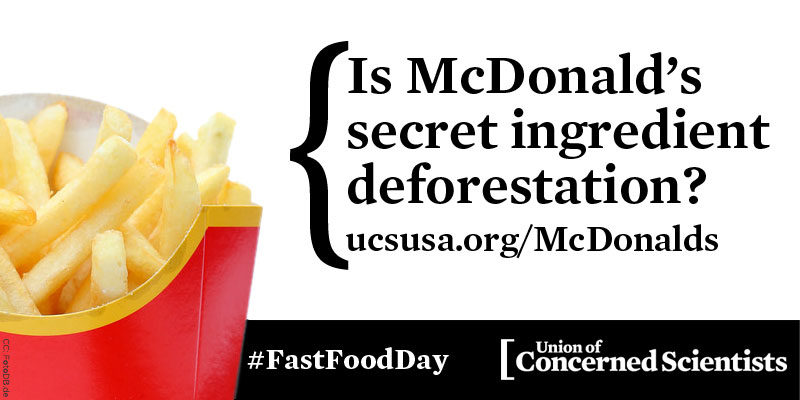Hold on to your hats because this coming Sunday is a day for parties. The Internet tells me that three different holidays fall on Sunday, November 16. First, it’s National Button Day which makes sense because who doesn’t love buttons? It’s also Have a Party with Your Bear Day. I’m thinking the best way to rejoice might be to listen to a classic childhood song. And lastly, it’s National Fast Food Day.
Even without knowing about the holiday, millions of Americans will likely celebrate by eating at a fast food restaurant – around 3% of the US population eats fast food daily. But as someone who works on the protection of tropical forests and our climate, I’m not exactly sure what I should be celebrating.

As tropical forests are cleared to make way for oil palm plantations, habitat for endangered species is lost and carbon is released into the atmosphere, driving global warming. Tropical deforestation currently accounts for about 10 percent of the world’s heat-trapping emissions. Photo: Rhett Butler
Fast food fail
Last March, UCS released a scorecard rating America’s top brands’ palm oil commitments on everything from ending deforestation and peatland destruction to transparency and traceability. Companies should be able to assure their customers that the palm oil used in their products does not come from the destruction of these ecosystems. Fast food companies did not score well. When compared to the packaged food and personal care sector, the fast food sector lagged far behind. At that time, only two of the ten fast food companies we scored had policies that even registered in our point system. The other eight received zero points.
The good news is that in the eight months since we released our scorecard (during which time National Hamburger Day (May 28), National Donut Day (June 6), and National French Fry Day (July 13) all passed) we have seen some positive steps. More than 300,000 consumers stood up for tropical forests, demanding that companies use deforestation-free palm oil. And giant corporations are listened- eight of the 30 companies we scored have since made increased commitments to deforestation-free palm oil!
The fast food sector is even starting to respond to the pressure. Dunkin’ Brands (owners of Dunkin’ Donuts and Baskin Robbins) and Krispy Kreme both released new palm oil policies in September, although neither goes as far as is necessary to protect forests and peatlands. However, America’s number one fast food company, McDonald’s, has shown little movement.
McDonald’s leads in palm oil use but not in commitments
Serving more than 70 million people every day in over 100 countries, McDonald’s is one of the top ten largest users of palm oil. In the United States this mostly comes in the form of baked goods like cookies and biscuits, but palm oil is used for frying in other regions. Yet McDonald’s current commitments on palm oil are woefully inadequate.
Despite signing on to the non-binding New York Declaration on Forests in September reiterating the global importance of forests, McDonald’s palm oil policies do not protect forests. McDonald’s has pledged that the palm oil it uses will support the production of sustainable palm oil by 2020. But they say that this commitment can be fulfilled through the purchase of GreenPalm certificates which, as I’ve explained previously, does not mean that the palm oil is free from deforestation. GreenPalm allows companies to purchase conventional palm oil and then purchase GreenPalm certificates separately (for a small fee). Companies then claim to support the production of sustainable palm oil, while continuing to use palm oil that is likely linked with deforestation and peatland destruction. So to briefly summarize McDonald’s commitment, they have pledged that more than five years from today, they will be fully covered using a scheme that is already outdated by today’s standards.
McDonald’s standards are unacceptable at a time when so many other users of palm oil have made explicit deforestation-free commitments. With a growing number of these pledges by traders, deforestation-free palm oil should soon be freely available on the market. Cargill, a major supplier of palm oil, recently pledged to eliminate deforestation from not only its palm oil but from other commodities linked to deforestation such as soy, sugar, beef, and cocoa.
We need your help to turn up the heat on McDonald’s this National Fast Food Day. As the largest fast food company in the world, McDonald’s should set the bar high. Call McDonald’s out publicly to follow through on its commitment to forests and make a strong pledge to only use palm oil that is free from deforestation by tweeting out the custom graphic.
International Day of Forests is March 21. With your action, by then we should have a reason to celebrate McDonald’s.

